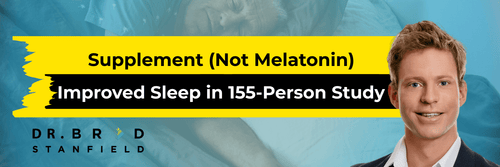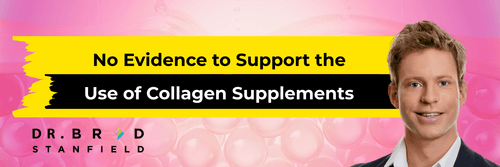Supplements are very popular the world over and range from simple vitamins and minerals to exotic plants and extracts to untested mixtures of unknown ingredients.
I'm not against taking supplements. Far from it; in fact, here's the list of everything I take myself. What I am against is supplements that have either not shown any benefit in clinical trials or that have drawbacks that far outweigh their benefits.
Today's list is nine of the second category: supplements I would never take because the risks far outweigh the benefits, as shown in human clinical trials.
Table of Contents
#1: Direct Antioxidants
Number one is direct antioxidants, particularly after exercise. Some examples include Vitamin A, high-dose Vitamin C, and Vitamin E.
When we exercise, we stress our body, and we release all sorts of oxidants, and that's a good thing. It signals to our cells that they need to be more efficient. So if we blunt that oxidative stress, we can blunt the effects of exercise.
This isn't just a theory; we have human clinical research showing this. For example, a randomized, placebo-controlled trial of 54 healthy men and women found that using Vitamin C and Vitamin E blunted the positive effects of exercise. Other studies have shown the same thing, and in a 2020 systematic review studying multivitamin and multimineral supplements, no benefit was found for these supplements in the prevention of cancer, cardiovascular disease, or death in general.
Moreover, the harm of these antioxidant supplements isn't just related to exercise. We have research indicating that Vitamin A and Vitamin E may actually increase mortality rates. This is because they interfere with the balance between oxidants and antioxidants. On top of this, there's also evidence that Vitamin A is associated with an increased risk of lung cancer.

I also want to spend a bit more time on Vitamin E specifically, because there's a lot of misinformation on social media about this molecule.
Vitamin E comes in a complex made up of 4 tocopherols and 4 tocotrienols. I've seen some people claim that any research about the risks of Vitamin E should be discarded because it was the alpha-tocopherol that was studied when, instead, it's the tocotrienols that should be studied.
Okay, sure. That's an area that should be studied. But that doesn't mean we should disregard the information we have about the safety concerns presented by Vitamin E complexes. We simply don't have a body of positive evidence, and what evidence we do have is negative.
All of this is why I chose not to include Vitamin A or Vitamin E in MicroVitamin and why I only include a low dose of Vitamin C. I created MicroVitamin primarily because of the COSMOS-Mind study, which showed a well-formulated multivitamin and multimineral supplement can help improve cognition. For more on that, see my recent post. As usual, remember that just because I take a supplement doesn't mean you should as well.
It's also important to note that I've referred to direct antioxidants here, not indirect antioxidants like Glycine. When we age, a powerful antioxidant called glutathione starts to rapidly decrease in our bodies from around age 45 onwards. By supplementing with the building blocks of glutathione, like glycine, we can support our body's ability to produce its own antioxidants and possibly improve aspects of health.
#2: Anti-Inflammatories
The second group of supplements I would not take are anti-inflammatories like CoQ10 and PQQ. When we exercise, we release oxidants and inflame the body. This is a natural process that we don't want to interfere with because it signals the body to become more efficient (in other words, build muscle strength).
A randomized trial found that CoQ10 supplements after exercising dramatically reduced the benefits of exercise compared to a control group. There's also no good evidence of benefit from CoQ10, with studies finding no value in preventing cancer or heart disease. Plus, there's good evidence that patients on statins don't get any benefits from CoQ10.
#3: Resveratrol
Third on the list is resveratrol. Overall, there's no good evidence that resveratrol provides benefits in either mice or humans. But, we do have great evidence that resveratrol blunts the positive effects of exercise, across multiple studies.

Plus, supplementing resveratrol has been shown to lower testosterone, so there are known harms to supplementing with this ingredient.
#4: Metformin (for non-diabetics)
Next up is Metformin for non-diabetics. While it's not a supplement, there are many people in the longevity field who take metformin for so-called "health-span benefits." So, I want to be clear here: in my clinic, not a day goes by where I don't prescribe metformin for someone who is diabetic or pre-diabetic because the evidence for those individuals is overwhelmingly positive. What I'm talking about here is non-diabetics using metformin.

We have great evidence from the diabetes prevention program where they trial over 3,000 non-diabetic adults, following up for 21 years. Half took a placebo, and half took metformin. Overall, there was no difference in all-cause mortality, cancer, heart disease, and more.
Just like with resveratrol, we do have evidence of harm. In multiple studies, metformin is found to block the positive effects of exercise by as much as 50% and also lower testosterone.
#5: Iron
The fifth supplement out of nine that I would avoid is Iron. I'm including this one because, when you look at Google's research, it shows that Iron is an incredibly popular supplement worldwide. This is probably because when people feel tired or fatigued, they may feel like they have low iron or anemia. Then, they start supplementing with iron.

If you've measured your blood iron levels and have found low iron, then an iron supplement is fine. However, if you haven't taken a test and you're just blindly supplementing with iron, you're likely doing more harm than good. We know from studies that iron can impair zinc absorption, and people can develop gastritis and gastric lesions from iron supplements.
Plus, an interesting study just came out that involved over 50,000 people. What they found is that people who had higher levels of iron seemed to have lower life expectancy.
#6: Calcium
Number six on the list is calcium supplements. Again, Google frequently lists calcium as one of the most popular supplements. Some people may need calcium supplements, such as vegans and people who avoid dairy products. However, outside of those people, some people just take calcium supplements to try to help strengthen their bones.

From the research we currently have, where calcium is supplemented alone or with Vitamin D, it doesn't seem to prevent bone fractures or breaks. Instead, it's possible that calcium supplements may contribute to developing kidney stones. There's also a concern that calcium supplements may contribute to the buildup of calcium in our blood vessels, though the jury's still out on that one. Some studies haven't shown evidence for or against it.
In general, there's no real benefit to calcium supplements if you're getting enough calcium from your diet, while there is the potential for harm.
#7: High Dose Folic Acid
For clarity, I'm not including pregnant women here. Outside of that indication, however, concerns have been raised that high folic acid intakes may accelerate the formation of cancer lesions and negatively affect the immune system. There's also some evidence that high-dose folic acid may contribute to cognitive impairment in older adults.

This is why MicroVitamin only has 200 mcg (50% of the RDI) of folic acid. It's a way to pair with a diet to reach RDI without blowing past it.
#8: High Dose Niacin
Niacin is a form of Vitamin B3. We have great evidence from a 2018 meta-analysis that high-dose niacin is associated with an increase in all-cause death rates by 10%. It also seems to cause an increase in new cases of diabetes, serious disturbances in blood sugar control, serious infections, and bleeding.

There are other forms of niacin; NR, NMN, and NAM. All of these, however, are converted in the gut into niacin, so it's effectively like taking the same thing regardless of form. This research comes from mice, and while we don't have human evidence to reflect it, there's a strong possibility that it's the case.
#9: Fat Burning Supplements
The final group of supplements that I would definitely avoid taking is fat-burning supplements. At the end of the day, there is mostly caffeine in these supplements, and you can get all of the caffeine you need from a few cups of coffee in the morning.
Hopefully, you've picked up on the theme of this list: these are all supplements that impair one of the three core pillars of health, which are your diet, your exercise, and your sleep. These, in particular, all negatively impact the results of your exercise.

On the other hand, there are supplements that can have a positive impact on these pillars of health. For example, creatine benefits muscle performance, and omega-3s can help prevent heart attacks. But these are just supplements and are meant to go on top of an already healthy lifestyle.
My goal with MicroVitamin is to develop a supplement that meets my goals, supplements my diet and accentuates my lifestyle. While it might suit your needs as well, don't take the fact that I take it as a recommendation that you should take it as well. Always talk to your own health professionals to discuss your goals, your needs, and your unique health situation. The nutrients you need – and the nutrients you already get – may be very different from my own lifestyle, and so, too, will your needs.
Sources:
- Vitamin and Mineral Supplements for the Primary Prevention of Cardiovascular Disease and Cancer: Updated Evidence Report and Systematic Review for the US Preventive Services Task Force: https://pubmed.ncbi.nlm.nih.gov/35727272/
- Dietary Supplements for Exercise and Athletic Performance: https://ods.od.nih.gov/factsheets/ExerciseAndAthleticPerformance-HealthProfessional/
- Antioxidant supplements for prevention of mortality in healthy participants and patients with various diseases: https://www.cochranelibrary.com/cdsr/doi/10.1002/14651858.CD007176.pub2/full
- Tocotrienols: Vitamin E Beyond Tocopherols: https://www.ncbi.nlm.nih.gov/pmc/articles/PMC1790869/
- Overview of vitamin E: https://www.uptodate.com/contents/overview-of-vitamin-e
- Effects of cocoa extract and a multivitamin on cognitive function: A randomized clinical trial: https://alz-journals.onlinelibrary.wiley.com/doi/10.1002/alz.12767
- Redox analysis of human plasma allows separation of pro-oxidant events of aging from decline in antioxidant defenses: https://pubmed.ncbi.nlm.nih.gov/12398937/
- Supplementing Glycine and N-Acetylcysteine (GlyNAC) in Older Adults Improves Glutathione Deficiency, Oxidative Stress, Mitochondrial Dysfunction, Inflammation, Physical Function, and Aging Hallmarks: A Randomized Clinical Trial: https://academic.oup.com/biomedgerontology/article/78/1/75/6668639?login=false
- Coenzyme Q10: https://www.nccih.nih.gov/health/coenzyme-q10
- Statin Safety and Associated Adverse Events: A Scientific Statement From the American Heart Association: https://pubmed.ncbi.nlm.nih.gov/30580575/
- Evaluation of Resveratrol, Green Tea Extract, Curcumin, Oxaloacetic Acid, and Medium-Chain Triglyceride Oil on Life Span of Genetically Heterogeneous Mice: https://www.ncbi.nlm.nih.gov/pmc/articles/PMC3598361/
- Resveratrol for adults with type 2 diabetes mellitus: https://www.cochrane.org/CD011919/ENDOC_resveratrol-adults-type-2-diabetes-mellitus
- Resveratrol blunts the positive effects of exercise training on cardiovascular health in aged men: https://www.ncbi.nlm.nih.gov/pmc/articles/PMC3810808/
- Exercise training, but not resveratrol, improves metabolic and inflammatory status in skeletal muscle of aged men: https://www.ncbi.nlm.nih.gov/pmc/articles/PMC4001758/
- Effects of Resveratrol on Polycystic Ovary Syndrome: A Double-blind, Randomized, Placebo-controlled Trial: https://pubmed.ncbi.nlm.nih.gov/27754722/
- Effect of Metformin and Lifestyle Interventions on Mortality in the Diabetes Prevention Program and Diabetes Prevention Program Outcomes Study: https://diabetesjournals.org/care/article/44/12/2775/138471/Effect-of-Metformin-and-Lifestyle-Interventions-on
- Metformin inhibits mitochondrial adaptations to aerobic exercise training in older adults: https://www.ncbi.nlm.nih.gov/pmc/articles/PMC6351883/
- Effects of chronic metformin treatment on training adaptations in men and women with hyperglycemia: A prospective study: https://www.ncbi.nlm.nih.gov/pmc/articles/PMC9321693/
- Effect of Metformin on Testosterone Levels in Male Patients With Type 2 Diabetes Mellitus Treated With Insulin: https://www.ncbi.nlm.nih.gov/pmc/articles/PMC8740051/
- Iron Fact Sheet for Health Professionals: https://ods.od.nih.gov/factsheets/Iron-HealthProfessional/
- Genetically predicted iron status and life expectancy: https://pubmed.ncbi.nlm.nih.gov/32690432/
- Calcium Fact Sheet for Health Professionals: https://ods.od.nih.gov/factsheets/Calcium-HealthProfessional/
- Calcium and vitamin D supplementation in osteoporosis: https://www.uptodate.com/contents/calcium-and-vitamin-d-supplementation-in-osteoporosis
- Folate Fact Sheet for Health Professionals: https://ods.od.nih.gov/factsheets/Folate-HealthProfessional/
- Supplemental Vitamins and Minerals for CVD Prevention and Treatment: https://www.sciencedirect.com/science/article/pii/S0735109718345601?via%3Dihub
- Low-density lipoprotein cholesterol lowering with drugs other than statins and PCSK9 inhibitors: https://www.uptodate.com/contents/low-density-lipoprotein-cholesterol-lowering-with-drugs-other-than-statins-and-pcsk9-inhibitors
- Balancing NAD+ deficits with nicotinamide riboside: therapeutic possibilities and limitations: https://www.ncbi.nlm.nih.gov/pmc/articles/PMC9345839/


















